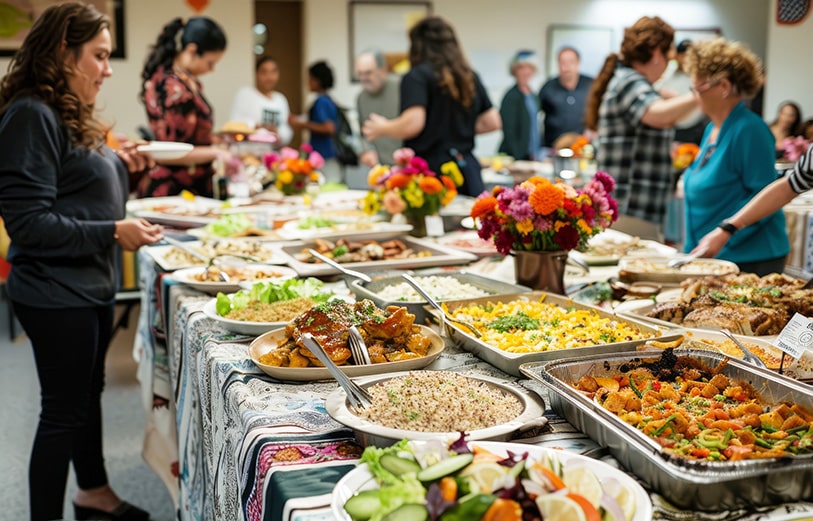Potluck Events: Essential Food Safety Tips

Ensure your potluck experiences are enjoyable and safe for everyone.
Making potluck events fun and safe.
Potluck events are wonderful opportunities for people to gather and share delicious meals. However, without proper attention to food safety, these events can pose health risks.
The Moultrie County Health Department (MCHD) wants your potluck events to be safe and enjoyable. Here are some essential tips for maximizing food safety:
Educate participants:
Distribute educational resources to event participants or enroll in food safety classes to learn the basics of safe food handling. Individuals who are knowledgeable about food safety are more likely to use healthier cooking practices and prevent foodborne illnesses.
Assign responsibilities:
Create a food safety plan before the event. Assign responsibilities to various individuals, such as bringing serving utensils, ensuring proper temperature control, and handling leftovers.
Practice proper hygiene:
Emphasize the importance of handwashing among participants, especially those involved in food preparation and serving. Remind everyone to wash their hands with soap and water for at least 20 seconds before handling food. Provide hand sanitizer stations for added convenience.
Ensure proper cooking temperatures:
Cook food to the appropriate internal temperatures to kill harmful bacteria. Use a food thermometer to ensure accuracy:
Ground meats: 160°F (71°C)
Poultry: 165°F (74°C)
Fish and seafood: 145°F (63°C)
Leftovers: Reheat to 165°F (74°C)
Maintain temperature control:
To prevent bacterial growth, keep hot foods hot (above 140°F or 60°C) and cold foods cold (below 40°F or 4°C). Use chafing dishes, slow cookers, or insulated containers to keep hot foods hot, and place cold dishes on ice or in a cooler.
Practice safe serving techniques:
Use clean utensils and serving dishes for each food item. Avoid leaving perishable foods out at room temperature for more than two hours (one hour if the temperature is above 90°F or 32°C).
Avoid cross-contamination:
Provide separate utensils and serving dishes for each dish to prevent cross-contamination between different foods. Assign servers or encourage participants to use serving utensils or disposable gloves when handling food items.
Handle leftovers safely:
Promptly freeze or refrigerate leftovers in shallow containers to promote rapid cooling. Label containers with the date and contents, and consume leftovers within 3-4 days. When in doubt, throw it out!
Safety when bringing homemade cooked foods or desserts:
When participants contribute homemade cooked food or desserts to a potluck event, there are additional considerations to ensure food safety. While homemade dishes often add a personal touch to the gathering, taking precautions to prevent foodborne illnesses is essential.
Here's how to safely handle homemade contributions:
Label and communicate:
Encourage participants to clearly label their homemade dishes with the dish's name, any potential allergens, and the person who prepared it. This information helps attendees make informed choices, especially those with dietary restrictions or food allergies.
Ensure proper cooking and storage:
Participants should follow safe cooking practices when preparing homemade dishes. These practices include cooking meats to the appropriate internal temperatures and refrigerating perishable items promptly.
Remind contributors to keep hot foods “hot” and cold foods “cold” during transportation and throughout the event.
Check for spoilage:
Before serving, inspect dishes for signs of spoilage, such as unusual odors, mold growth, or changes in texture or color. If any doubts arise about the safety of a homemade dish, it's best to err on the side of caution and discard it.
Make potluck events a healthy and enjoyable experience.
Safe food preparation and serving can help ensure that your potluck events are enjoyable experiences.
If you have any questions or concerns about food safety, don't hesitate to contact the MCHD office at (217) 728-4114 for assistance.

